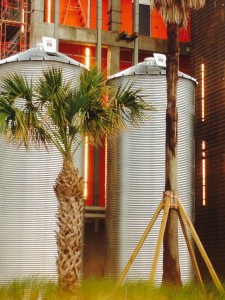 Both commercial and residential rainwater collection customers are expressing more interest than ever before, which is a large part of the reason that RainBank Rainwater Systems has seen a 50% bump in growth over the last year.
Both commercial and residential rainwater collection customers are expressing more interest than ever before, which is a large part of the reason that RainBank Rainwater Systems has seen a 50% bump in growth over the last year.
Architectural and engineering firms are including rainwater collection systems in their designs. Cities, and counties throughout the state are beginning to understand the connection between stormwater management and rainwater collection.
Developers are saving money on large water bills with rainwater collection, while complying with he “Green Storm water Infrastructure” (GSI). Green building and low impact development are becoming more popular with the general public. Residential customers, new construction and retrofits are recognizing the long-term cost savings, water quality, and security of a more decentralized water system. As a whole, the public is becoming more environmentally aware of our environmental impact and are finding ways to make that impact positive.
County and City planners, building departments, and health departments need to have the tools to make proper choices of acceptance, promotion, code and permitting of rainwater collection systems. RainBank’s president, Ken Blair is the American Rainwater Catchment Systems Association’s (ARCSA) Northwest regional representative and can schedule an ARCSA workshop for those civil departments, engineering and architectural firms this summer in Seattle. Interested parties please contact Ken using the contact form, or directly at Ken at RainBank dot info.


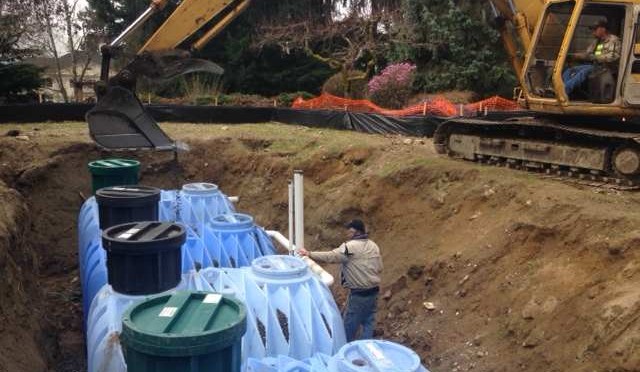
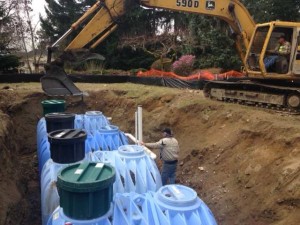 7,200 gallons of collected rainwater for household usage has no visual impact for this newly constructed Bellevue home. The homeowner wanted to have a rainwater catchment system to provide water for the toilet and laundry facility, but he did not want large, above ground water tanks interfering with the landscaping of his backyard.
7,200 gallons of collected rainwater for household usage has no visual impact for this newly constructed Bellevue home. The homeowner wanted to have a rainwater catchment system to provide water for the toilet and laundry facility, but he did not want large, above ground water tanks interfering with the landscaping of his backyard. The solution: excavating the old cement swimming pool and placing four 1800 gallon poly water tanks in its place, creating an underground rainwater collection system. All the tanks are connected with a manifold for equalization and supply a pressure tank and filtration in the mechanical room for usage. Solenoid valves provide automatic switching from rainwater to city water if the tanks should run low, but will switch back to rainwater when the tanks receive more water from the roof.
The solution: excavating the old cement swimming pool and placing four 1800 gallon poly water tanks in its place, creating an underground rainwater collection system. All the tanks are connected with a manifold for equalization and supply a pressure tank and filtration in the mechanical room for usage. Solenoid valves provide automatic switching from rainwater to city water if the tanks should run low, but will switch back to rainwater when the tanks receive more water from the roof.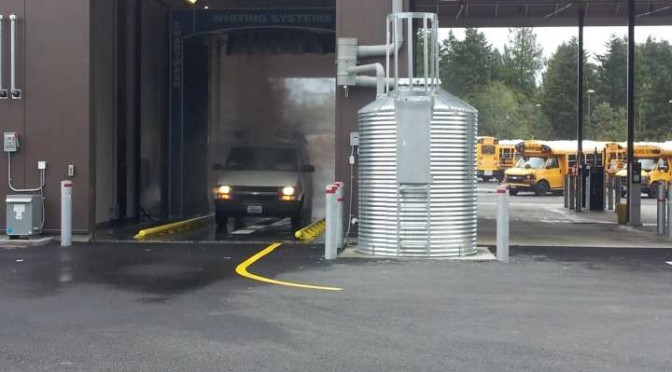
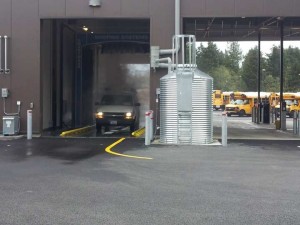 With less vegetation, more square footage of impervious surfaces, and more population density, cities contribute to the bulk of storm water runoff. Rethinking how we control storm water in our urban environments is essential to the health of our bodies of water. During large rain events, a sewer system can be overwhelmed with runoff, causing intentional releases, with pollutants entering our rivers, lakes, bays, and estuaries.
With less vegetation, more square footage of impervious surfaces, and more population density, cities contribute to the bulk of storm water runoff. Rethinking how we control storm water in our urban environments is essential to the health of our bodies of water. During large rain events, a sewer system can be overwhelmed with runoff, causing intentional releases, with pollutants entering our rivers, lakes, bays, and estuaries.